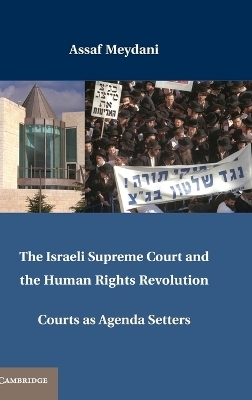
The Israeli Supreme Court and the Human Rights Revolution
Cambridge University Press (Verlag)
978-1-107-01262-2 (ISBN)
This book explains the reciprocal relations between the Supreme Court and the Israeli political system. It is based on a unique approach that contends that the non-governability of the political system and an alternative political culture are two key formal and informal variables affecting the behavior of several political players within the Israeli arena. The analysis illustrates the usefulness of such a model for analyzing long-term socio-political processes and explaining the actions of the players. Until this model changes significantly, the decisions of the High Court of Justice express the values of the state and enable Israel to remain a nation that upholds human rights. The Court's decisions determine the normative educational direction and reflect Israel's democratic character with regard to the values of human rights.
Dr Assaf Meydani is a Senior Lecturer in the School of Government and Society at the Academic College of Tel-Aviv–Yaffo. His research interests include public policy, politics and law, and political economy. Dr Meydani has been a Visiting Scholar at the Center for New Institutional Science at Washington University in St Louis, Missouri, and the Institute of Management, Innovation, and Organization at the University of California at Berkeley. He is author of Political Transformations and Political Entrepreneurs: Israel in Comparative Perspective (2009). His articles have appeared in journals such as Israel Studies, Israel Law Review, Policy and Society, Constitutional Political Economy, Rationality and Society, and Land Use Policy.
1. Introduction; 2. The intervention of the Israeli High Court of Justice in government decisions: an empirical, quantitative study with paradoxical results; 3. Law and politics: theoretical aspects; 4. The Supreme Court as a political entrepreneur in the process of institutional change - an analysis based on shared mental models and political entrepreneurship; 5. Israeli public law; 6. Israel in light of structural and cultural variables; 7. The Supreme Court and the political system in light of social and political processes in Israel during 1948–99; 8. The struggle for a new conservative constitutional court (2000): redefining the guarantor of human rights in Israel - the role of the Israeli Supreme Court; 9. The rule of 'who governs' as electoral capital (1999–2007): the Supreme Court as an agenda setter in Israel; 10. The Supreme Court of Israel as an agenda setter: three cases; 11. On law, society and policy design - towards a reform in the relationship between the High Court of Justice and the Knesset; 12. Conclusion and normative implications.
| Zusatzinfo | 3 Tables, unspecified; 7 Line drawings, unspecified |
|---|---|
| Verlagsort | Cambridge |
| Sprache | englisch |
| Maße | 156 x 234 mm |
| Gewicht | 490 g |
| Themenwelt | Recht / Steuern ► Allgemeines / Lexika |
| Recht / Steuern ► EU / Internationales Recht | |
| Recht / Steuern ► Öffentliches Recht ► Verfassungsrecht | |
| Sozialwissenschaften ► Politik / Verwaltung | |
| ISBN-10 | 1-107-01262-7 / 1107012627 |
| ISBN-13 | 978-1-107-01262-2 / 9781107012622 |
| Zustand | Neuware |
| Haben Sie eine Frage zum Produkt? |
aus dem Bereich


